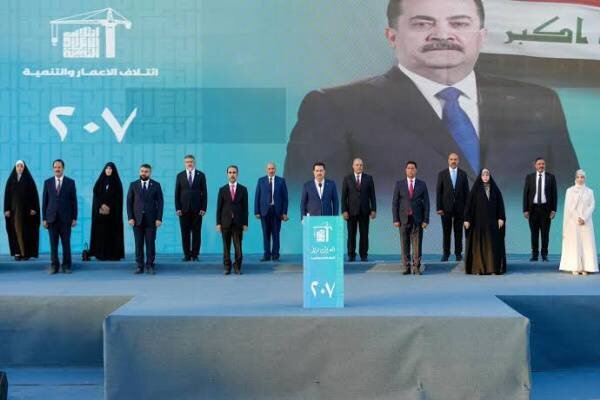Rivalries Emerge to Seize Iraqi Parliament; Duel at the Heart of Coordination Framework

Guest Commentary, Mohaddeseh Rezaei: in Iraq’s complex and ever-turbulent political scene-where alliances form based on survival and power, and loyalties have short expiration dates-the parliamentary elections on November 11, 2025, will be far more than routine political events. They mark a decisive turning point. Above all, these elections pit two poles born from within the same camp: the Shiite Coordination Framework (الإطار التنسيقي).
On one side stands pragmatic Prime Minister Mohammed Shia al-Sudani, architect of the “Service Goverment,” who seeks to extend his premiership and cement his position as a national leader through the broad reconstruction and Development Coalition (ائتلاف الإعمار والتنمية).
Opposing him is veteran politician and former prime minister Nouri al-Maliki, who leads the tightly knit, personally centered State of Law Coalition.He aims to regain initiative, curb his emerging rival’s rise, and prove that he remains Baghdad’s key power broker. This contest is a struggle between a popular technocrat and a powerful behind-the-scenes strategist-a battle likely to reshape Iraq’s political landscape for years to come.
The Pragmatic Architect: Al-Sudani’s Bid for renewed Mandate through the Reconstruction and Development Coalition
Mohammed Shia al-Sudani emerged in 2022 as a compromise candidate from within the Coordination Framework after prolonged deadlock. Over two years, he has skillfully transformed himself from an assigned prime minister into an self-reliant leader. Leveraging his social capital alongside infrastructural achievements as political currency, he formed Iraq’s largest electoral bloc: Reconstruction and development.
This coalition acts as an expansive umbrella uniting diverse yet strategically aligned figures under its banner-united primarily by their aim to prolong al-Sudani’s tenure.
A Dissection of an Eclectic Coalition
An examination of this alliance reveals both strategic pragmatism-and risk-inherent in al-Sudani’s approach. The core remains his own Furatain movement which defines much of its identity.
The inclusion of influential figures such as Faleh Fayyadh, head of Popular Mobilization Forces (linked with Ata’ Movement), along with former Labor Minister Ahmed al-Asadi (associated with Fateh coalition via Sumer list), adds considerable security-political weight. While generally associated with resistance axis factions ideologically,both are known politically for pragmatic approaches seeking balanced foreign relations for Iraq.
A surprising element is former Prime Minister Iyad Allawi‘s presence-a secular figure long aligned closest to Washington-now allied alongside Fayyadh and Asadi supporting a prime minister backed by Shiite coordination forces. This paradox underlines al-Sudani’s effort to forge cross-ideological support across Iraq’s societal spectrum.
Strategy & vulnerabilities
The ultimate goal announced openly by this coalition-which fielded over 470 candidates across twelve provinces-is simply extending al-sudani’s premiership. Their strategy rests on three pillars: first, showcasing government infrastructure accomplishments; second, attracting influential personalities across various demographics to maximize votes; third, forging behind-the-scenes deals with Sunni leaders ensuring post-election support toward forming majority blocs.
However, significant challenges threaten cohesion due to ideological diversity among members-perhaps their Achilles heel. Critics recall Haider al-Abadi’s Nasr alliance in 2018 which collapsed despite initial popularity because internal contradictions unraveled it post-election.
A prevailing concern among observers asks whether securing a strong second term woudl lead al-Sudani into political realignment diverging sharply from those who propelled him initially-a possible transformational “political shedding” awaits him if reelected.
The Sheikh Politician & “Shadow Government”: The Return of State of Law Coalition
In contrast to Sudani’s colorful new coalition stands an established entity characterized by unity & predictability: nouri al-Maliki’s undisputedly dominant State of Law Coalition.Their structure resembles more that of classic party machinery than lose electoral front-all paths leading unequivocally back to Maliki himself.
A Personality-Centric Political Machine
The State of Law coalition boasts credit including Maliki’s two terms as prime minister (2006-2014) during which Haider Al-Abadi emerged under its auspices in 2014.It has increasingly solidified since 2018 into distinct formation excluding dissenters systematically.This consolidation enhances internal coherence but marks it clearly as personality-driven vehicle dependent wholly on Maliki’s influence.Meanwhile,it secures loyalty within conventional Shia voting bases forming one pole consistently dominant except eclipsed briefly during contested runs like previous decade’s transformations.
“Government Within Government” Strategy
Nouri Al-Maliki has earned reputation orchestrating what critics call “shadow government”: exerting control over decision-making even when out-of-office.This tactic remains palpable within current Sudan cabinet despite rivalry.Openly opposing Sudan’s premiership extension,the State of Law-affiliated media attack him harshly citing allegations such as Baath Party membership simultaneously occurring four key ministers(National Oil,Electricity,Sports,Agriculture) belong directly to their quota or candidates endorsed by them.In stark contrast,to Sudani faction there are only two cabinet members aside from Sudani himself.This glaring inconsistency supports claims Sudan faces opposition not due solely policy differences but as govt independence resists so-called shadow rule illustrating alleged shortsightedness attributed repeatedly at Maliki-as an example,having brought Abadi forcefully onto stage only then becoming greatest opponent; likewise presenting Sudan recently then turning principal challenger again today.
Maliki’s electoral theory revolves around fortifying loyal voter bloc weakening main adversary via media offensives reinforcing Coordination framework dominance still centralized effectively beneath apparently unified command led solely just by him.
Summary: Choosing Between Independence & Behind-The-Scenes Power
The forthcoming Iraqi election crystallizes confrontation between governance philosophies sharing common origins.Yet Mohammed Shia AlSuddanee’s Reconstruction&Development list embodies technocratic pragmatism aiming beyond historic ideological divides building national independent base leveraging service record.AGamble bet reflects intent fashion new politics amalgamating seemingly contradictory elements.
Conversely,NuriAlMalikiasStateOfLaw represents classical politicking backed institutionally wielding shadow influence guarantees continuity appealing stability loyal constituenciesWhileaccused suppressing genuine autonomous leadership ascendancy.
Iraqis voting November11face choice beyond listsBetween path yielding fragile,butinclusive independent premierversus establishment installing firmly embedded strongman consolidating control.Such outcome shapes not only immediate Premiership,butbalancepower core shaping Iraqi politics critical comingyears.


